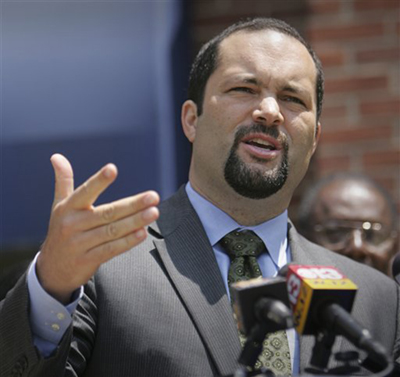
Benjamin T. Jealous, national president and CEO
Roslyn Brock, national chairwoman
Alice Huffman, California state president
Leon Jenkins, L.A. branch president
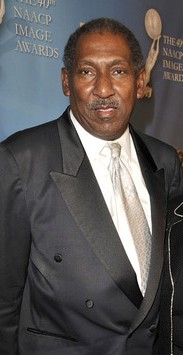
Willis Edwards
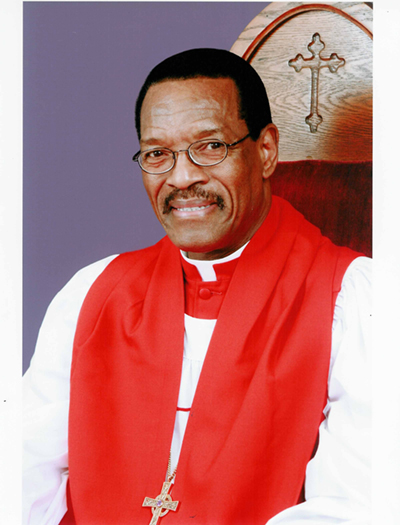
Bishop Charles Blake
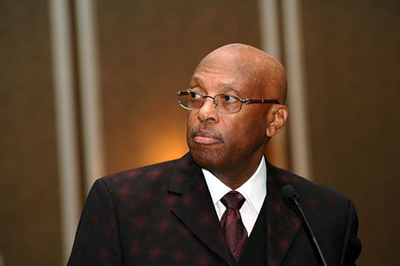
Rev. Melvin Wade
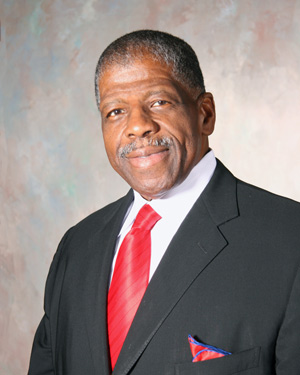
Bishop T. Larry Kirkland
As the nation’s oldest civil rights institution, the NAACP has been a major force in the nation’s courts for civil rights for over 100 years, and continues up to today
By Yussuf J. Simmonds
Sentinel Managing Editor
For over one hundred years, the National Association for the Advancement of Colored People (NAACP), the nation’s oldest and largest civil rights organization, has been leading the fight primarily in the courts to maintain and sustain the American creed that all men are equal under the law. From the ballot box to the classroom, the thousands of dedicated workers, organizers, leaders and members who make up the NAACP continue to fight for social justice for all Americans.
One of the greatest landmark cases in the nation’s history came about due to the vigilance and ‘stick-to-itive-ness of the NAACP. The Brown v Topeka Board of Education stands as a landmark monument to the legal prowess of the organization. Notwithstanding, that legal team was headed by the late Thurgood Marshall, who would later become, the nation’s first Black Associate Justice of the U.S. Supreme Court.
In July 2011, the NAACP has convened its annual convention in Los Angeles, to share its experiences, as it continues to fight for equal justice under the law, and though much progress has been made, much is still left undone throughout the country. And that is why wherever, there is injustice, the NAACP is there trying to right pervasive wrongs.
Whether it’s the U. S. Sentencing Commission on the guidelines disparity related to crack cocaine sentences (mostly for Blacks and Browns) versus the same for powder cocaine (mostly used by Whites and the wealthy); or challenging big banks to adopt fair, equitable and non-discriminatory lending practices; or helping fight the stark inequity in the condition of New York City public schools; or keeping tabs on EPA’S cross-state air pollution rules that impact health conditions by holding power plants accountable; the NAACP stay in the forefront on the legal issues that affect the lives of those who are most vulnerable.
(For example: the sentencing disparity becomes most apparent when the outspoken and well-respected U.S. District Court Judge, Terry Hatter, commented that “you can’t get crack (cocaine) without powder (cocaine).”
Yet, in the past, crack cocaine users have been given draconian prison sentences and powder cocaine users mostly gets the proverbial “slap on the wrist.”)
And though there has been some movements by the sentencing commission to level the sentencing field, there is still some ways to go. And that is where the NAACP does much of its work–trying to right blatant–and some covert–wrongs in the interest of all concerned.
Some of the men and women in leadership positions at the NAACP whose work makes a difference are national president, Benjamin T. Jealeous; national chair, Roslyn Brock; California state president, Alice Huffman; president of the L.A. branch, Leon Jenkins; and national board member, Willis Edwards.
In addition, several local clergymen will play prominent roles as the convention debuts in L.A. They are: Rev. Melvin Wade, Bishop Charles Blake and Bishop T. Larry Kirkland.
BENJAMIN T. JEALOUS
Though he did not have a high profile nationally, NAACP’s current national president and CEO, Benjamin Jealous was the president of a private, non-profit, venture capital foundation prior to his ascendancy to lead the organization in 2008. His experience as director of the US Human Rights Program at Amnesty International (AI) has been a great asset in facing some of the legal challenges at the helm of the NAACP. While at AI, he focused on issues such as federal legislation against prison rape, racial profiling, and expose the sentencing of children to life without the possibility of parole.
Jealous also served as Executive Director of the National Newspaper Publishers Association (NNPA), which consist of over than 200 black community newspapers, and as the managing editor of the Jackson Advocate, Mississippi’s oldest historically Black newspaper, where he exposed corruption among high-ranking officials at the state prison in Parchman.
With some of those credentials, Jealous was a natural to lead the NAACP. At 38, he is the youngest national leader of the organization.
ROSLYN BROCK
Roslyn Brock made history when she became the youngest ever and fourth woman to serve as Chairwoman of the National Board of Directors of the NAACP. For over two decades, Brock served the NAACP in several leadership roles. She is a Diamond Life Member of the NAACP and joined the Association as a freshman at Virginia Union University.
In 1989, under the leadership of Rev. Dr. Benjamin Lawson Hooks, Brock wrote her Master’s Thesis on “Developing a NAACP Health Outreach Program for Minorities” and that may have laid the foundation for her to assume her present position. She is a skilled grant writer and has secured millions of dollars in grants since for NAACP programs even before assuming leadership of the board of directors. Some of those grant funds initiated the Health Symposiums that are held annually at NAACP National Conventions.
Then in 1999, Brock was appointed Chair of the Board Convention Planning Committee where she led the Committee to institute fiscal policies that resulted in the Convention becoming a profit center for the organization with average net revenues of at least $1 million dollars a year.
And in 2005, Brock created the Leadership 500 Summit with several other young adult members of the NAACP. The Summit’s goal has been to recruit, train and retain a new generation of civil rights leaders aged 30–50 to the NAACP. Since its inception, Leadership 500 has contributed handsomely to the NAACP National Treasury and has led to the support of many more new and other organizational activities.
And at 45, Brock is also the youngest chair of the NAACP’s national board.
ALICE HUFFMAN
Since 2000, Alice Huffman has been the president of the California NAACP where her aggressive-styled leadership has cause the organization in the state to be one of the most sought after organizations in public policy arena. The office, located in downtown Sacramento has become a hub of activity for politicians of all stripes seeking the support of the NAACP for a myriad of activities from fiscal to redistricting to educational and political issues, Huffman’s finger is on the pulse of what going on.
Employing a small staff to focus on key community issues, she believes that the NAACP is the constant voice for low income African Americans and students trapped in low performing schools. She is also a member of the National Board of Directors of the NAACP.
Though the NAACP is non-political, Huffman as a business owner of her own consulting firm that specializes in initiative campaigns, strategic public policy issues and grass roots organizing, is adept at adapting to the power structure, be it Democratic or Republican. She was appointed by former Governor Arnold Swarzenegger (a Republican) to the State Parks and Recreation Commission and the California Complete Count Committee for the 2010 Census, even though she openly supports Democrats.
Huffman is president of Future PAC, a national organization that supports the election of progressive African American women, serves on the Board of the Center for Democratic Participation and is a member of the California Democratic Party Executive Committee and the Democratic National Committee.
Huffman also enjoys outstanding relations with state and national leaders.
LEON JENKINS
Leon Jenkins is the current president of the Los Angeles NAACP; he has been a community leader and activist in the South Los Angeles community for over 25 years. His community involvement includes judicial and legal intervention programs for at-risk youth; challenging the Los Angeles Unified School District and City of L. A. to provide better educational opportunities and resources in the African-American community; mentoring and sponsoring community youth groups; and spearheading gang intervention, prison reform, and rehabilitation programs.
As one concerned about democracy and the civil rights of all citizens, Jenkins aligned himself with the National Association for the Advancement of Colored People (NAACP), became an active Life member, and began advocating for the rights of others. He served on the Executive Committee of the L. A. branch, where he held the chairmanship for the Legal Redress Committee for over ten years. That position led to him being elected as first vice president of the branch. In 2008, Jenkins was elected as president of the L. A. NAACP and two years later, he was re-elected to another two-year term where he currently still serves.
WILLIS EDWARDS
Willis’ center of activity has been the NAACP. His activist role in the organization has earned him the title in some circles, as “Mr NAACP.”
He became active in the NAACP through the Beverly Hills/Hollywood Branch. He and the branch took a gigantic leap of faith when they embarked on the journey to have the NAACP Image Awards nationally broadcast on television.
Under Edwards’ leadership, the NAACP Image Awards was created by the Beverly Hills/Hollywood branch in 1967. When Edwards became active in the 70’s, he thought that Blacks should be recognized publicly and in the Hollywood tradition of awards shows for what they have contributed to the entertainment industry; and, the event should be used as a showcase and power base to further influence Hollywood to open the doors of job opportunities. That meant the program should be nationally televised. With the help and advice of Tabu Records President, Clarence Avant and NBC Vice President of Children’s Programming, Phyllis Tucker Vincent a meeting was set with NBC President, Brandon Tartikoff and the rest is history. The Image Awards went national on NBC in 1986. According to Clarence Avant, ” Because of Edwards’ tenacity, committed activism, and leadership, the Beverly Hills/Hollywood Branch of the NAACP is responsible for more people working in Hollywood both in front of and behind the cameras today.”
Edwards is also one of the founders of the NAACP Beverly Hills/Hollywood Branch Theater Awards that recognizes the accomplishments and talents of African American actors, writers, directors, and producers in live theater.
The awards presentation now has a theater festival component where young artists can display their talents; and attend seminars and workshops on the ins and outs of a theater career. This year, Edwards is serving as Co-Chair of the NAACP Theater Festival that will be held August 26-28, 2011 culminating with the NAACP Theater Awards on Monday, August 29, 2011.
Edwards has served on the National Board of the NAACP for 12 years






